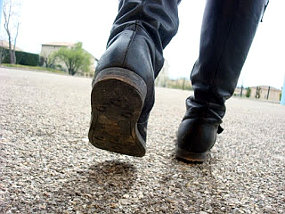Simon Peter answered him, “Lord, to whom shall we go? You have the words of eternal life….”
—John 6:68 ESV
One of the oddities I’ve encountered in talking with Christians who have been walking with Jesus for decades is that many of them are asking the question Simon Peter asked of Jesus. There’s a sense that many are looking around, wondering if this Christian “thing” is it.
I find this odd because this renewed asking of Peter’s question is starkly opposite the intent of the original. Context should help:
“I am the bread of life. Your fathers ate the manna in the wilderness, and they died. This is the bread that comes down from heaven, so that one may eat of it and not die. I am the living bread that came down from heaven. If anyone eats of this bread, he will live forever. And the bread that I will give for the life of the world is my flesh.”
The Jews then disputed among themselves, saying, “How can this man give us his flesh to eat?”
So Jesus said to them, “Truly, truly, I say to you, unless you eat the flesh of the Son of Man and drink his blood, you have no life in you. Whoever feeds on my flesh and drinks my blood has eternal life, and I will raise him up on the last day. For my flesh is true food, and my blood is true drink. Whoever feeds on my flesh and drinks my blood abides in me, and I in him. As the living Father sent me, and I live because of the Father, so whoever feeds on me, he also will live because of me. This is the bread that came down from heaven, not like the bread the fathers ate, and died. Whoever feeds on this bread will live forever.”
Jesus said these things in the synagogue, as he taught at Capernaum. When many of his disciples heard it, they said, “This is a hard saying; who can listen to it?”
But Jesus, knowing in himself that his disciples were grumbling about this, said to them, “Do you take offense at this? Then what if you were to see the Son of Man ascending to where he was before? It is the Spirit who gives life; the flesh is no help at all. The words that I have spoken to you are spirit and life. But there are some of you who do not believe.” (For Jesus knew from the beginning who those were who did not believe, and who it was who would betray him.) And he said, “This is why I told you that no one can come to me unless it is granted him by the Father.”
After this many of his disciples turned back and no longer walked with him. So Jesus said to the Twelve, “Do you want to go away as well?” Simon Peter answered him, “Lord, to whom shall we go? You have the words of eternal life, and we have believed, and have come to know, that you are the Holy One of God.”
—John 6:48-69 ESV
 The context here is that Jesus laid out such a Christ-centric statement that the challenge of it blew his followers’ theology to pieces, and they could not accept it, which led to only the core group of followers remaining with Him.
The context here is that Jesus laid out such a Christ-centric statement that the challenge of it blew his followers’ theology to pieces, and they could not accept it, which led to only the core group of followers remaining with Him.
What strikes me is that mature Christians today are asking, “Lord, to whom shall we go?” not because what they are facing is too challenging because it is too Christ-centric, but the opposite: Christian faith in the 2010’s has become too facile and not nearly Christ-centric enough.
This reversal in what is stimulating the question amazes me.
What you have are mature believers frustrated to death with dog and pony show churchianity that talks about everything BUT Jesus, and they are going to Jesus and asking, “To whom shall we go?”
Of course, there is nowhere to go but to Jesus, but the problem for those older believers isn’t with Jesus; it’s with the dead religious show that is foisted on them in churches across our country.
Where do you go to get away from that and to the real thing?
A recent study showed that the apparent decline in church attendance isn’t what it appears to be. Yes, on any given Sunday, fewer Christians are in church. But the real reason is that more and more Christians don’t feel obligated to attend church every week. They may skip a dozen Sundays or more in a year, where once that kind of “mostly there” attendance was unthinkable. In short, the number on the church rolls hasn’t changed, just how many of them attend on any given Sunday.
I wonder how many of those folks are struggling because they feel that need to be in church, but they can’t take week after week the inautheticness of the packaged religious experience that passes for church in America 2014. So, they skip now and then.
Perhaps it should be: “Lord, to where should we go?”
If anyone can answer that question, please let the rest of the country know.


 Most of our communities have shattered. We roam far from our birthplaces in search of what does not ultimately satisfy, fracturing family and robbing us of connection. We have little time for each other, for that once-tribe that helped root in meaning those who preceded us. Even the imprisoned apostle Paul had his faithful companions who cheered him with their presence. Without them, would the writings of that great apostle have taken an even more somber tone? There’s a reason why God intended the Church to be a communion: He himself is a communion.
Most of our communities have shattered. We roam far from our birthplaces in search of what does not ultimately satisfy, fracturing family and robbing us of connection. We have little time for each other, for that once-tribe that helped root in meaning those who preceded us. Even the imprisoned apostle Paul had his faithful companions who cheered him with their presence. Without them, would the writings of that great apostle have taken an even more somber tone? There’s a reason why God intended the Church to be a communion: He himself is a communion.